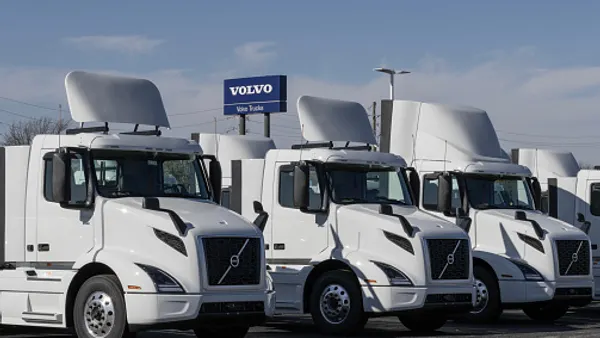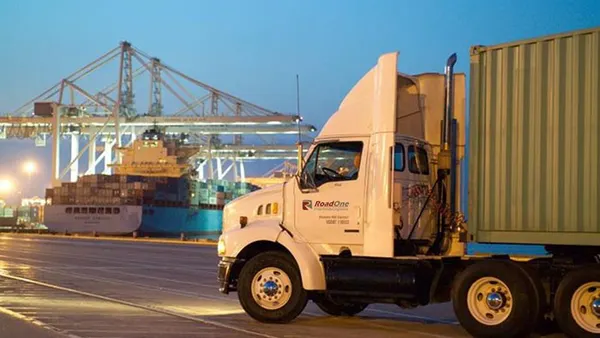Dive Brief:
- Daimler reported a "significant" recovery in its Trucks and Buses segment in Q3, the company said in an earnings release Friday. Daimler Trucks' incoming net orders in North America were up 60% YoY in Q3.
- Daimler market share improved, Harald Wilhelm, Daimler's finance chief, said. But total global production for trucks fell 25% YoY. North American sales fell 22% YoY.
- Wilhelm told investors and analysts that the outlook for the entirety of 2020 accounts for a large decrease in truck sales in 2020, but he did not specify by how much. Daimler Trucks sold 488,500 units in 2019. The company predicted such sales decreases across all its segments. But Wilhelm also projected improvements in its markets, and the OEM does not expect to be set back by further complications from the pandemic.
Dive Insight:
Daimler Trucks North America is the largest truck OEM in North America with dominant market share. So, when Daimler catches a cold, the entire market will likely get sick, too. If Daimler is correct about large-scale, pandemic-driven impacts being a thing of the past, that bodes well for the industry.
One of Daimler's competitors reported on Monday that housing and construction business have helped its truck orders. Paccar noted that September's orders were 18% higher than September 2019, although the company is not back to pre-pandemic business yet.
And Volvo reported on Oct. 16 the same level of orders as Daimler. Truck order intake increased 61%, compared to a weak Q3 last year. Part of the uptick is due to some fleets putting orders in during Q3 that they normally would have put in during Q2, Volvo said. Truck deliveries were down by about 15,000 units YoY, Chief Financial Officer Jan Ytterberg said on the earnings call.
The comparison to Q3 2019 might be easy, even during a pandemic. During the freight boom of 2017 and 2018, many fleets rushed to make orders. When the freight market slowed, so too did orders, leading to 2019 having the lowest Class 8 orders in a decade. Then came COVID-19 in March 2020.
Now, other trucking-related firms are also stabilizing, according to Morgan Stanley research. Morgan Stanley's latest bi-weekly survey of about 400 transportation carriers, shippers and brokers "showed persisting stability in COVID impacts." The firm said carriers were adjusting to the "new normal" but are on a "standby as uncertainty still looms surrounding a possible virus resurgence and political uncertainty."
On the OEM front, optimistic fleet managers seem to be making the orders. ACT Research reported on Wednesday that U.S. trailer orders in September were 51,208 units, up 174% YoY.
"The confluence of several factors is evident in September’s third-highest monthly net volume in history," wrote Frank Maly, director of commercial vehicle transportation analysis and research at ACT Research. "Pent-up demand is one factor, as we’re now seeing capex release that was curtailed earlier this year by COVID-driven uncertainty. Another factor is lower build rates, pushing fleets to quickly submit their orders, rather than take a chance that new units might not be delivered until well into next year."
Maly said further "solid numbers" are likely in the near-term, as the industry's usual "order season" arrives.









